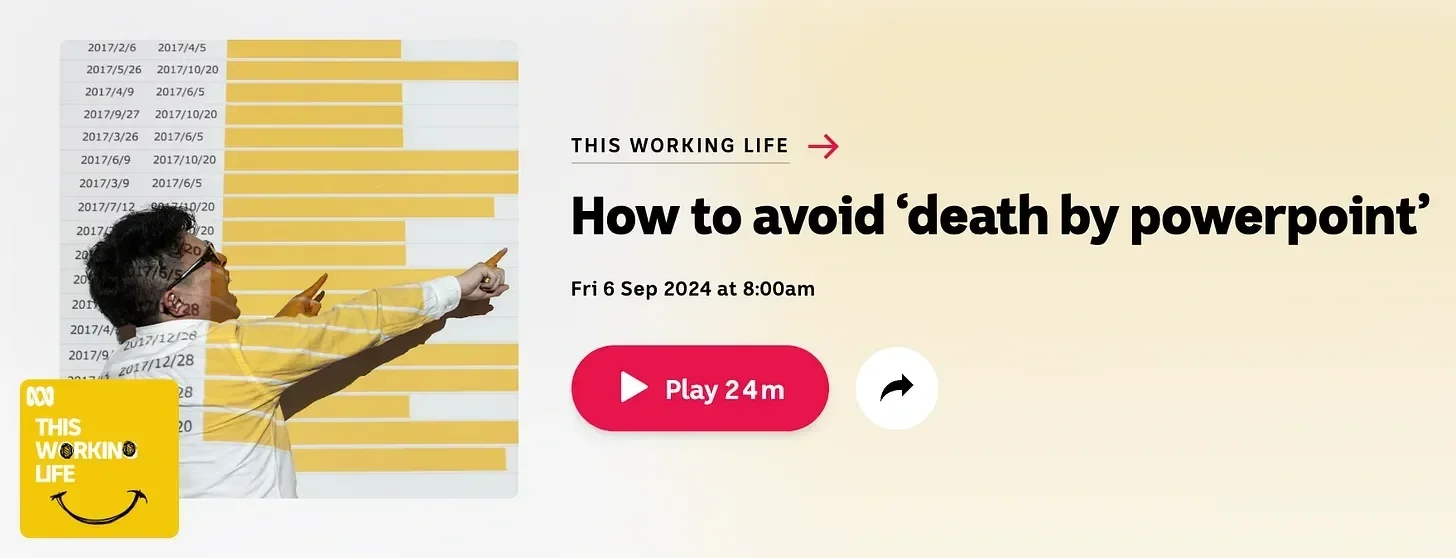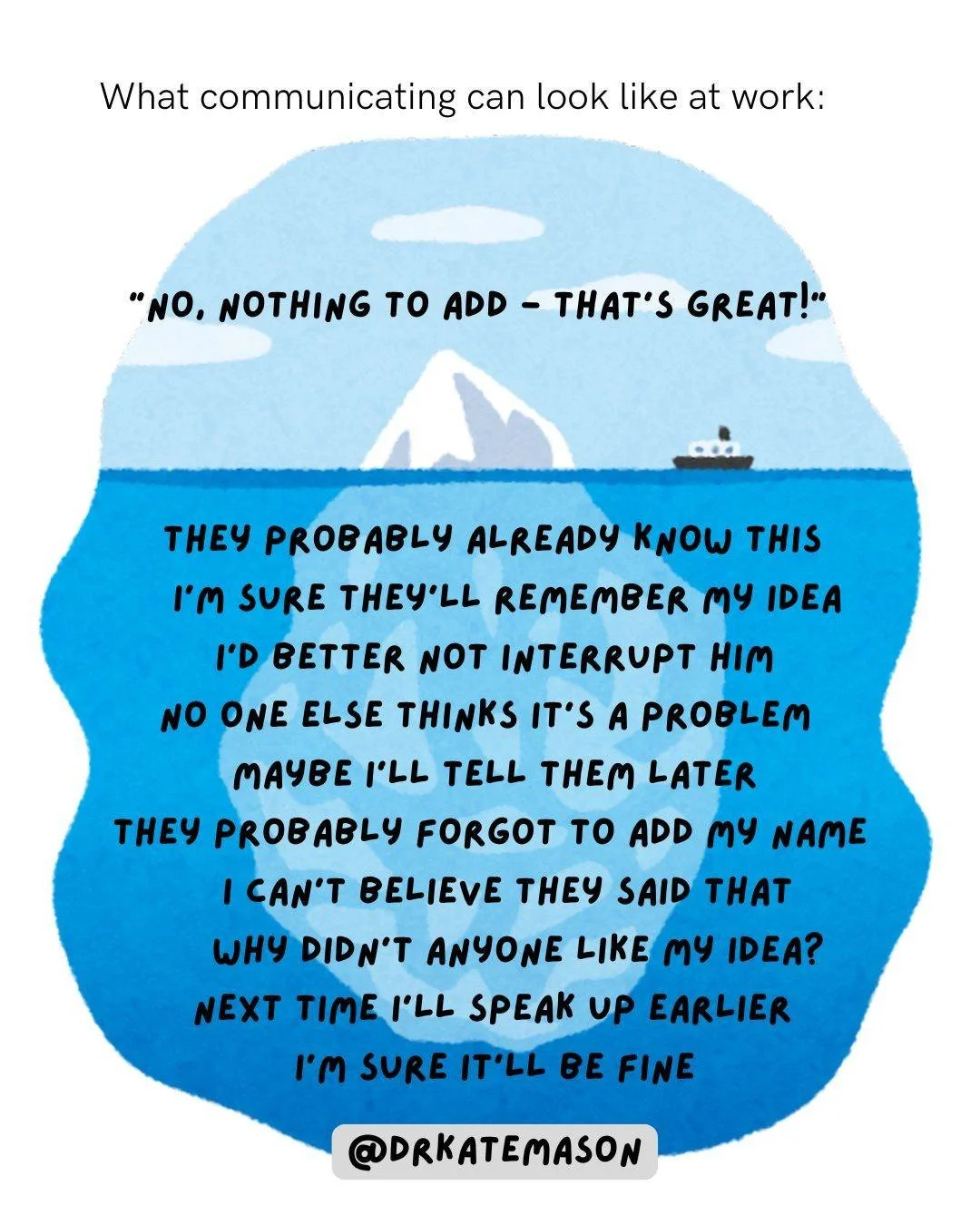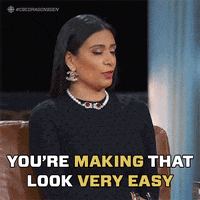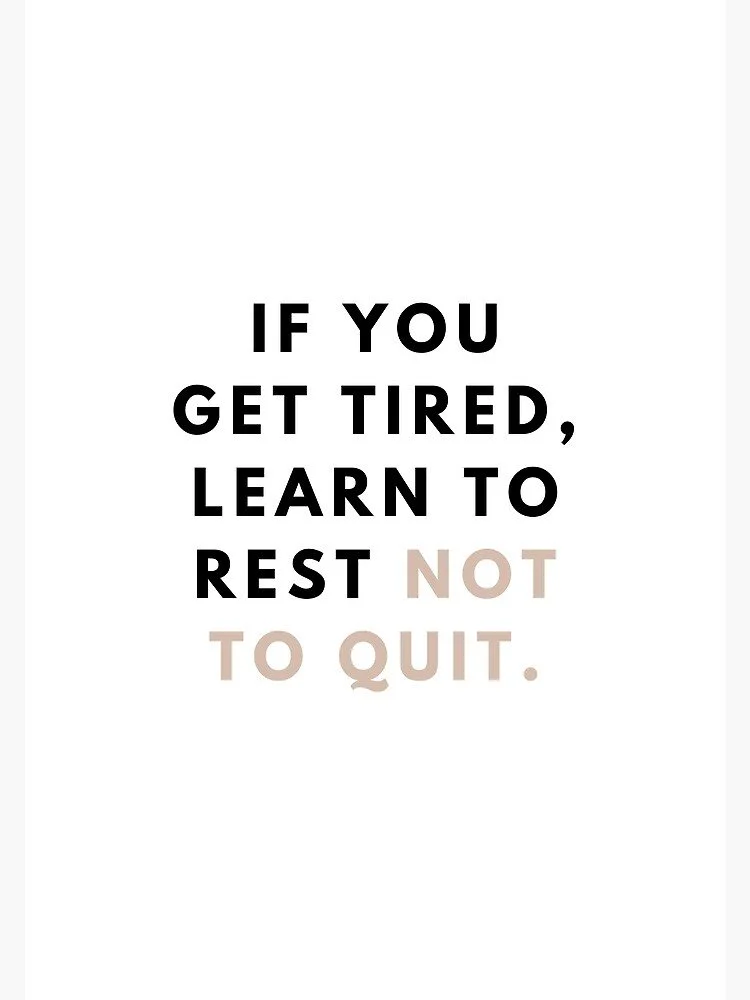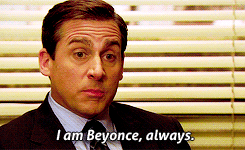My favorite way to communicate with calm
Finding your “antidote state” can transform how you communicate—shifting from constricted and stuck to curious, grounded, and free-flowing.
This week, I wanted to share some ideas I’ve been thinking about regarding communication and what I’m calling physiological safety.
I think this is key to more connected, more trusted and more effective working relationships.
I conceptualize physiological safety as the feeling of being safe in your body, especially at work.
Feeling grounded, more connected to what you want, knowing how to get there and being more emotionally regulated. Sounds nice, eh?
One of the ways you think about this is discovering what your Antidote State is.
Let me explain.
One of my clients told me she felt constricted at work, like she was wooden and stiff.
When she’d describe to me how she was showing up and communicating, overwhelming feelings of constraint came through: her throat would close up, her shoulders would scrunch high near her ears and if she stood in front of a room, she’d feel rooted to the spot; unmoving and immobile.
I wanted to find what I thought of as an antidote state for her: how could we re-imagine a new mental state or posture to find a truer, freer feeling, a direct antidote for constriction or constraint?
Could we find a communicative mode where she felt more fluid? Where her words would flow easily and fluently?
When I invited her to describe what her aspirational state would look and feel like, she told me she craved a space where she could "comfortably share my thoughts, test hypotheses, be curious, and have free-flowing ideas", which I thought was such an elegant and beautiful articulation.
We ended up calling this a space of “relaxed curiosity with spacious knowledge" - an idea countering the feeling of constraint she was experiencing.
Once we had named this state, I asked her to practice 'stepping into it' each time she had a conversation or interaction at work: could she imagine herself in her new relaxed, spacious state and then proceed?
It might feel a little clunky at first (a relaxed, imaginative state? Oh please!), but it's been a small revelation for her.
A week or so later I got an email from her saying that this is the first time in a long while that she's been "enjoying conversations" and feels comfortable "voicing my thoughts, even the more confrontational and provocative ones". What a win! The physical constraint she experienced has vanished in favor of seeking out her curiosity.
Why an antidote state works so well is because there's something powerful in leaning into the idea of a mental state or posture in which you feel comfortable and then taking your most comfortable self into the meeting.
It's an immediately actionable and practical re-frame that helps us literally imagine or envision a new state and let it seep into our communication.
Invitation: Describe to yourself or someone else what your ideal communicative headspace might look or sound like. It might be an antidote to any current communicative issues you’re experiencing. Decide on a shorthand name for this space and remind yourself of it when you’re feeling under threat.
Communicating with grace
Grace might just be the most underrated power move in leadership—one that builds trust, eases tension, and transforms how we connect.
While I’m far from being physically graceful, I’ve been thinking a lot about the idea of grace, lately, and how it shows up in relation to power and likeability at work.
I’ve come to realize grace is absolutely foundational to communicating and connecting with those around you.
It’s one of the biggest sources of strength and I believe, one of the most underutilized modes of power there is.
Here’s how it works.
Giving grace to ourselves:
The practice of giving yourself grace is not one that comes easily to many of us.
But letting go of some of the self-flagellation we impose and instead just moving forward can be the best thing we do for our own mental health as well as our communication.
Own your mistakes honestly and without drama. In this way, grace lets us be flexible: “You’re right, my bad, let me fix that.”
Grace to yourself in leadership terms could also look like preparing a little less, or being easier on yourself in the moment.
There’s no such thing as an operator doing big things who makes no mistakes, so know you’re not alone on this one.
Being and feeling gracious in the way you show up – being kind, considerate, thoughtful not only builds trust and creates warm environments around you, and it is also fosters effective communication.
Giving grace to others
Assume good intent from those around you (unless you hear otherwise) if you’re in a psychologically safe environment.
Grace lets you fall over and get back up again.
Grace is one of the ways out of worrying about your likeability; combining it with authority is one of the many ways I talk about showing up as powerfully likeable.
Grace unlocks doors, opens conversations, deepens relationships and helps you sleep better at night.
Grace tells us which fights to fight and which ones we should let go.
Grace is extraordinary. It exists in a world which often tells us it has no value, and yet it survives. Let’s make it thrive.
Invitation:
Are you showing up with grace? What could you do to show more grace to yourself and others at work?
Three things to remember about managing up.
“Managing up” isn’t about manipulation—it’s about mastering communication that makes leaders trust and listen.
"Managing up" is a term that I've always found really gross.
It implies that I'm trying to manage or manipulate someone above me.
But really, managing up is effectively communicating to your peers or seniors and keeping them across your work.
This sounds like a simple ask or an obvious thing to do but it's shocking how many problems result when this particular train goes off the tracks.
I think about the communications (and miscommunications) between different parties a lot - and it's amazing how many universal truths we can recognize whether it's between a founder and a peer, a big boss and a middle manager or even, counter-intuitively, a lawyer and a judge.
For instance, one of my lawyer friends says this of his court appearances: "I feel the best thing I can try to aim for is simply to give the Judge the right information in the right order to assist in getting the message across, and then showing them (rather than just telling) where that information can be found in objective places, like in evidence or cases."
This statement has so many gems in it, I thought it was worth unbundling it as there are some best communications practices hiding there in plain sight.
1. Give the right information
Too often we're coming to a manager with our own list of worries, or some tangential thing rather than thinking, what do they need of me right now? What can I do to specifically answer a question they have, or fix an urgent problem? We think we're aligned, but often times we can diverge from each other quickly, so think about whether the focus of your meeting and time with them is most usefully allocated and flex accordingly.
2. Give the information in the right order
This idea doesn't get nearly enough air time. Think carefully about the logical and/or strategic benefits to the order in which you present your ideas or agenda items.
e.g. Don't start with the least-urgent idea first. Or do: but do it knowing it's easier to get a yes early in the meeting.
e.g. Do you always run out of time with this person?
Then think about what your must-have item of discussion will be and put that first.
e.g. Does your ask need context?
Put that up the top and then signpost where you're going so your interlocutor can be ready for what's ahead.
3. Show, don't tell
Evidence, data, case studies - whatever it's called in your work - it's the key to excellent persuasion and helps anchor your argument rather than flailing about. When used in the right context, few people can argue with facts: you're not using the fact to ambush them or talk yourself up, you're just being true to the record.
Caveating yourself, if that makes sense?
Do you soften your ideas with caveats like “I’m not an expert, but…”? These subtle disclaimers—what I call Imposing Syndrome—erode confidence and credibility.
All hail the subtle caveat. (Or not).
Hi friends,
It’s true: it’s hard to feel powerful in a room which might judge us for a bad idea or being ill-prepared, so we over-rotate and play small by giving caveats.
One of my clients, Aimee says, “I usually begin with the phrase, “I’m sure you’ve already thought of this” like a stealthy beginning. I know it’s bad, but I do this just so I don’t annoy anyone at the table – maybe they’ve already thought of the idea.”
Giving a caveat like this at the outset is such a fast way to lose credibility or diminish oneself.
It’s in a very similar genre to other caveats such as: “I’m not an expert but…” or “I’m not across this like you are but…” or “This might be wrong but…/I don’t know if this is right, but….?”
Honey, I shrunk the executive.
These are classic what I call Imposing Syndrome flags: what we sense when we say these is a degree of impending judgement for an opinion or that our opinion might impose on the group to an unlikeable degree.
Maybe we’re pushing back against what everyone else thinks, or expressing doubt about a plan, so we try to soften it by diminishing ourselves. Or maybe we’re just genuinely unsure.
Think of it this way: Imagine if you went to see a mechanic and asked what was wrong with your smoking car, and they said, “Well, I’m not actually an expert in cars, but it might be, like, a blown gasket? Or the muffler? I’m not sure.” It just doesn’t engender confidence!
Imposing Syndrome can mess with our internal powerful/likeable binary because it exists exactly at that pressure point; right at the painful intersection where we want to exert our power, but we also worry about being That Guy.
In these moments, Imposing Syndrome can show up uninvited and ready to party: its insistence is super loud and hard to wrangle with. While it might feel like hedges are softening the blow or making it less obviously strident, a caveat or disclaimer hints or warns others that we are on wobbly terrain and in some senses, that we shouldn’t be trusted. And I suspect we’re often giving these caveats to seem approachable, humble, and kind. We’re leaning into the likeable side at the expense of having any power in the interaction.
Invitation: If caveats are your thing, again, note where and when you might be giving them. Does it happen with a particular person or in a particular situation? Spend the next week or so noticing if they come up again, and decide if they feel appropriate or if you’d like to experiment with changing them.
It's not about you......
If you often feel nervous before presenting, here’s the secret: it’s not about you…
It's not about you.
This might sound rude, but saying this to yourself is the quickest way to becoming a more impactful and powerful speaker.
It's also often the first thing I say when coaching someone who is nervous about presenting.
And what I mean is, the process of disseminating information is made so much more easy if you can take yourself out of the equation.
If you focus on the outward-facing elements of your work, you’ll find your own emphasis shifts in your delivery.
You’ll be more energetic, more flexible, and more in tune with your own power.
Outward-facing (things you can control):
-Your time, advice, energy etc.
Inward-facing (Things you cannot control):
Judgment, fear, uncertainty etc.
Me?
My motivation is often, "I think this will be useful for the room, so I'm going to focus on usefulness."
Suddenly I'm less worried about my word choice or my clothes or any number of concerns: my focus coalesces around my motivation.
What motivates you when you speak?
Remember: it’s not about you. (It’s about your audience).
Why Speaking Up at Work Matters More Than You Think
What if the thing you’ve been holding back is exactly what your team needs to hear?
How many times have you decided not to speak up at work?
Not to voice an objection in case of push-back?
Not to call out bad behavior for fear of retribution?
Not to add your idea because "they've probably already thought of it"?
We're depriving the teams around of us of excellent insight, ideas, and knowledge when we purposely hold back.
If any of this feels familiar to you, don't despair.
We are all icebergs, but sometimes some of the stuff below the surface definitely deserves to see daylight.
🧊 What if your idea could help change the trajectory of a project for the better?
🧊 What if your question clarified something that everyone else was unsure of?
🧊 What if standing up for a value helped everyone else feel more free to do the same?
The voices of self-doubt can be so loud, but usually if you're paying attention, the thing you want to say is likely really valuable to others. Next time you hear one of these, think about how speaking up might benefit the team, the project, or yourself.
Since when does power have to come with a side dish of eww?
Real power in leadership isn’t about being the loudest in the room—it’s about the quiet authority that earns trust and leaves a lasting impact.
In all the coaching work I do on finding power, authority and persuasive communication, not once do I suggest anyone be cruel, humiliating, insulting, belittling or irresponsibly emotionally dysregulated.
And yet when we see portrayals of power, it’s very often coupled with these same things.
I think it’s one of the many reasons power can feel unwieldy or unwanted to otherwise kind, humane people: we don’t want to risk the blowback or lose ourselves to behavior which feels anathema to our own beliefs.
So we assume, ergo, we are not powerful or don’t have permission to be.
There are so many other types of power and authority for the taking.
💥 Think of your friend with excellent boundaries who says no to an ask but maintains the respect of her colleagues in so doing.
💥 Or your colleague who is comfortable to say they’re wrong, assumes responsibility and puts a plan in place to ensure it doesn’t happen again.
💥 Or even the acquaintance you know who is comfortable in her skin, and manages her team with excellence and ambition.
💥 Or the colleague who takes on feedback, and gives generously to others with incisive, actionable, and priceless help.
We might not hear these stories often, because they’re not headline-grabby.
They’re quieter, calmer, and I’d suggest, more powerful. Why?
Because they’re based in grace and not fear.
What got me here won't get me there
ChatGPT said:
Success at the next level isn’t about pushing harder—it’s about practicing patience, reflection, restraint, and grace.
What got you here might not get you there.
I was speaking with a friend the other day who said what I think is a profound statement.
She said:
"I find it hard to accept that I can't just power through but I'm also asking myself why I can't give myself time and a little more grace."
Anyone else relate?
Brute force may well be the thing that got you through until now.
If you've always used brute force to power through things, there will come a time where it doesn't quite work the same as it used to.
Starting a new job?
Moving to a new country?
Taking on a new team to manage?
I don't know at which inflection point, but you might need to have a second or third gear into which you can switch.
Sometimes being able to 'clever' your way through things just won't cut it.
Brute force is powerful but it's also a blunt instrument.
It's the hammer seeing everything as a nail.
And as we know, not everything is a nail.
Sometimes it'll require grace, patience, self-reflection, time, growth, apology, restraint, or nuance.
These are the things which are infinitely harder to practice and murkier.
They don't suit a LinkedIn listicle and they're not easily sum up-able, but increasingly I think they're the keys to everything.
The annoying thing about "You make it look so easy"!
When someone says, “You make it look easy,” remember: ease is never the starting point—it’s the result of years of practice.
"Oh you make it look so easy!".
I hear this fairly often when people see me speak in public, and wanted to let you know, it was absolutely not always this way.
When I was ten years old, I used to turn bright red in the face, get dry-mouthed, and my hands would shake uncontrollably.
That was in my first ever debate.
And while I was absolutely terrified (of everything), I was almost immediately addicted to the rush of having to get my words together, to make my case, to tell even a scary room what I thought.
I often look back and feel so grateful to a teacher, Mr Ross, who suggested I try debating and who patiently taught me its nuts and bolts.
But also - telling someone that they make it look easy isn't the compliment you might think it is.
Whatever the skill, it usually takes many years to develop something to the point where it appears effortless.
Acknowledging that fact is to me a much deeper compliment: it says, Thank you for seeing me and the journey I've taken to get here.
If you're after some help supercharging the way you present, I have a little present for you in the form of my downloadable (and free!) presentation checklist:
"I didn't think you had it in you"
ChatGPT said:
Being underestimated often has less to do with your ability—and more to do with how (or if) you show up in the room.
Have you ever been underestimated?
"I didn't think Kate had it in her."
I had just finished running a huge event many years ago, and my boss was telling me she thought I did a great job.
And she paused, and told me that one of the senior VPs had said this to her at the beginning of the project.
(Yes, I agree, not a great or motivating moment from a manager!).
And it made me realize how much of showing up is in the optics.
How did it happen?
Well, I didn't say much in a kickoff meeting of about twenty people because I thought it had been said by others (and I was taking notes/processing a lot, too).
Obviously to me, talking in that meeting had nothing to do with my capability - and yet to this VP, it was everything.
She judged my whole self on one hour where I didn't say much.
Remember that we all interpret communication - or its lack - in very different ways.
I still don't talk much in a meeting if I don't think I'm offering anything of value, but if I had my time again, I would have taken a few minutes in that meeting to introduce myself at least, and flag what I was going to be running, instead of assuming everyone already knew or that it was inefficient.
There's not a clear right or wrong, here, but it's worth keeping in mind if you're working with someone closely.
What are their communications norms?
What are yours?
How can you help them understand you better?
How to respond to someone undermining themselves
The next time a colleague says, “I don’t know if this is important, but…”—pause and give their words weight: “Let’s hear it, this matters.”
What do you do if a colleague is undermining herself?
It's a question I've been asked by both men and women - how do I help her see her own value or stop diminishing it in front of others, and I love this question so much.
In part, because it shows careful listening and observing of others around us (mad communication skillz) but also because it shows genuine care for a colleague and a desire to help them succeed - both of which are my love languages!
So let's imagine the situation if this is a peer:
Woman: "I don't know if this is important, but…"
"Could I just take a second to walk you through X… - it won't take long" etc.
You: "Hey of course. And this sounds important, so let's give it the time it deserves and put some time in to talk it through together. How about this afternoon?"
If you can show a positive action (and not necessarily call out "Hey you were undermining yourself - stop doing that"), it provides psychological safety and space for that woman to bring herself to the meeting and show you what she's capable of.
This is such an enormous, practical vote of confidence: I promise you she will shine in that meeting.
If this person is your direct report, you might want to give them the feedback more explicitly:
Woman: "I'm so hopeless, I keep forgetting!" "I'm the worst!" etc
You: "Hey, I've noticed you have really negative self-talk about your work when you say XYZ and I wanted to call it out because you're doing great, and there's no need to preface the work with those caveats or disclaimers."
Have you experienced this, and what have you done to help the other person feel comfortable?
Love to hear from men on this one, especially.
Tiny acts of communicative feminism
Micro-underestimations can seem small, but they quietly shape how others see us—and how we start to see ourselves.
Microfeminism, is that you?
Lately, I've really enjoyed reading about microfeminisms - the intentional, small acts to change the way we think about women in spaces and at work, especially.
Acts like putting a woman's name first when emailing a man and a woman, referring generically to CEOs as "she", or claiming the armrests when you're in the middle seat (IFKYK).
It's got me thinking about the chronic amount of micro-underestimations we often face, for no good reason than our gender.
They're not harsh enough to be microaggressions; they're not intended to be rude, but the underlying assumption most certainly is.
Why did you assume small?
Why not just ask a general question?
Here are a few examples I've experienced lately - I would love to hear yours.
❓ "What time are you speaking on the small stage?" (Reader: I spoke on the big stage.)
❓ "When are you self-publishing your book?" (Brag alert: My book deal is with Penguin Random House.)
❓ "I'm ringing you because I didn't want to bother your partner." (We both work - we are both responsible for the matter you're calling about.)
❓ "That was actually really helpful!" (I appreciate you found it helpful, but did you have to sound surprised?!)
Rephrasing these would have looked like:
💥 What time are you speaking today?
💥 Tell me more about the book you're writing?
💥 I'm ringing with a question for you
💥 Thanks so much! ;)
Being a high-achiever patient or How I learned to rest
An anesthetist once told me to be a “high-achiever patient.” 🛌
Not by doing more—but by resting better than anyone else.
It turns out, recovery is an achievement.
Communicating your need for rest.
“Be a high-achiever patient”.
This is what an anesthetist told me once after a major surgery.
She looked at me and said, “I know you think you heard the part about resting, but you must rest. I don’t want to see you back in hospital next week because you went home and rearranged your pantry, and we have to do a corrective surgery.”
I was shocked.
Not because she was so forthright but because I had absolutely planned to rearrange my pantry on my sick leave.
Instead, her reframe of being a “high-achiever patient” struck something in me.
I was going to be the best at recovery ever!
I would rest harder and better than all those other post-operative chumps!
I was going to sleep and lie around and stay on top of my pain meds better than anyone in the history of surgery!
And reader, I did.
I recovered slowly and with strength and didn’t look back.
I think of this phrase and reframe a lot.
Sometimes to get better, we really have to concentrate and work on not doing the thing, in order to thrive.
If something helps you look after yourself, but you’re finding it hard to prioritize, think about being a high-achiever self-carer or whatever it is, and maybe it’s more familiar to put your energy in that direction.
Best trick for confidence? Forget about it. (Seriously).
Confidence isn’t something you fake—it’s what grows when you lead from authenticity and self-trust.
"I've been told I need to work on my confidence" is usually the first thing from my clients' mouths.
And we work together on everything but.
Because focusing on "confidence" is paradoxically the worst way to get it.
It's a sneaky metric and can work to undermine our communication efforts and hinder our voice, reach, and impact.
Giving someone feedback such as "be more confident" is like saying, "Win a gold medal" or "Be healthy".
It's great in theory: but it's very hard to understand the actionable roadmap to get there.
Confidence is an outcome and not a process.
Also, confidence:
Is often super gendered: It gestures towards masculine-coded forms of power (loud voices, big opinions, wide stances, firm handshakes etc). This hamstrings women who try to be "confident" and also does a disservice to men who might not subscribe to some of those ideals as well.
Gets you into your head: It's a one-sided metric that only focuses on you and not your audience. No one says "thanks so much for that confident meeting" - they thank you for help, for listening, for great ideas.
Encourages inauthenticity: It gets you further away from yourself, because it endorses inauthenticity as a premise. It sends a message that you'll get success when you become someone else, which is frankly plain dangerous.
In short: confidence is all about you and doesn't care about anyone else.
True power doesn't come from pretense: it comes from deciding you're comfortable in your own space.
Shhh! It's the best communication secret out there.
The most powerful voices often belong to those who know when to stay quiet and truly listen.
"The better I am at listening, the more in flow I get."
One of my brilliant clients said this to me the other day and I've thought a lot about it, since.
So much of communicating is actually about listening.
Stopping, and getting out of your own head and into asking yourself:
🙋 What does this meeting need of me?
🙋♀️ What does this organization need from me?
🎁 How can I be a gift to the person sitting across from me?
Is there something they're trying to tell me and I'm brushing over it or not truly paying enough attention?
Listening carefully helps us - maybe counterintuitively - often get what we need, too.
We're better able to understand the true needs arising around us and can take the time to decide how we'd like to respond. 💫
Finding our voice (but losing ourselves)
Winning by aggression cost me more than it gave—teaching me that true influence comes from being powerfully likeable, not just persuasive.
When I was 18, I won a World Championship. It was at the World Schools' Debating Championships in Johannesburg, South Africa, and I also ranked 9th best individual speaker in the world.
Winning a world title (yes, even a pretty dorky one) at eighteen gives one an unusual perspective, to say the least: it seemed, well, obvious that anything was possible with a lot of hard work and practice.
I had come a long way from the shaky, red-faced ten-year-old who used to use about 400 palm cards for a two minute speech!
But here’s the thing.
I think I won because I played the only game I saw around me: I was stern, adversarial, and hyper-aggressive.
And while I was obviously good at being those things, the experience left me with a sense of longing: I had won the tournament but lost something of myself.
I look at photos of me from that time and I see a self-conscious and defensive-looking young woman, carefully calculating exactly how to show up; calibrating just how angry I was allowed to be.
I don’t see the full me.
And it stayed with me, this feeling of incompleteness; of not knowing how to show up as my true self.
It didn’t go away because I won the trophy: if anything, it only revealed itself to me even more.
This is the challenge of powerful likeability - and what I'll be writing my book on, which will be out later this year.
(Don't worry - I'll tell you all about it when it's available for pre-order!).
Hit reply if you've had an experience of finding your voice but losing yourself - I'd love to hear about it.
The worst advice you can give or receive.
“Calm down” never works (and only makes things worse 😅).
Real calm helps us think clearer, reason better, and connect more deeply. In fact, calm communicators are often the most influential ones in the room.
It's the most annoying thing to hear...
Source: Ryron Gracie
I get it, we all have days or even weeks when we're stressed.
We feel it in our sweaty palms, our nervous stomachs, our elevated heartbeats.
You know what the worst thing to do in this situation is?
Telling someone - yourself or anyone else - to "calm down".
Unfortunately, I have learned that calm does not - shall not! - come by invoking its presence or demanding it to show up.
A truly terrible circle of life. 100% do not recommend.
Calm comes when we can get our bodies and our minds to a place where we can focus, breathe, and let ideas come to us freely and without constraint.
Similarly, we get our points across with more clarity and impact when we are calm: we think better, we reason more easily, and we have more elasticity in our mood.
When we are calm, our stakeholders receive and perceive us as less threatening, less adversarial and more collaborative.
Calm communicators are more influential and impactful communicators: we prize their rationality, thoughtfulness and level-headedness.
In short, in work and in life, calm can help us convince, persuade, and connect.
I'm devoting a whole chapter of Powerfully Likeable to calm: what sort of things do you want to know about calm communicating?
Any tips you've found useful for being calm at work?
"I'm not going to be a good student for you"
Coaching isn’t about changing who you are—it’s about amplifying your authentic voice. One client went from skeptical to confident, simply by leaning into his own style
One of my coaching clients said this to me in our first session.
He's been working with me over the past few months to prepare for an IPO and he sat in our first session, arms crossed and defensive, saying:
"Kate, I don't present well if I don't believe in it".
"I'm skeptical".
"I'm not going to be untruthful. I'm just not going to be a good student for you."
Record scratch: just how did we get here, again?
A lot of people think that communications coaching is designed to move you away from your own self and what's truthful - by dissembling or 'spinning'.
That can be true of some PR, but communications coaching is actually about getting much closer to what's true - both in fact, and in your own sense of self.
Are you naturally loud with a lot of energy? Great!
Quiet, introspective, serious? Wonderful!
Thoughtful, shy, sweet? Excellent!
A good communications coach can help you lean more into whatever your mode so you can find a space where you're showing up like yourself, and not as a weird, inauthentic stranger.
As for my client?
He turned out to be a brilliant student.
He listens, he's paying attention to his logical structure, and he's learned how to become more impactful and powerful when he speaks.
I think he might even be enjoying himself :)
I'm so nervous that I can't seem to stop talking.
Ever caught yourself rambling in an interview? 😅 My client once gave an 11-minute answer to a single question. Here’s how to stop the “nervous word-party” and keep your responses sharp, structured, and memorable.
11 minutes.
That’s how long one of my client’s answers was when she and I were practicing for an interview she had coming up.
In fact, it was a lot longer, as I only started timing it some way through her answer.
When people are nervous, I often see the real-time dissociation from their words, their face, and their ability to read the room.
This client is a smart operator and can tell me why a long, winding answer is a no-go. And yet…
So, what to do if you’re feeling a nervous word-party come on?
Here are my favorite ways to think about this:
Remember what the question was.
If you’re in a job interview or a nerve-wracking situation, it can help to note down the question being answered.
It’s surprising how many of us forget what it was!
So if you find yourself wavering, you can come back to the through line:
“And THAT'S how I ended up living and working in the UK".
Use one example, only.
A neatly-structured response usually only has room for one example - maybe two.
If you’re asked, “tell me about a time…”, the number there is implicit: they don’t want to hear every single time, just one can illustrate the whole.
Consider the most succinct way to tell the story.
Concentration span is becoming increasingly short. Get in, lay out the example, get out!
Don’t talk just to avoid silence.
Sometimes an interviewer is looking to see if you’re rattled. If you finish an answer and there’s some silence, just sit with it and wait for them to break it. It’s their podcast - you’re just the guest.
Wooly mammoths and negative self-talk
That inner critic? The one that says “you’re not ready” or “you’ll fail”? It’s ancient—and it’s lying to you. Here’s how to talk back to negative self-talk and reclaim your confidence.
"I bet I'm not strong enough to spear that woolly mammoth"
"I wish my ability to create fire was more consistent"
"I just know everyone's going to judge my new hand-axe"
When do you think negative self-talk actually began?
So many people I coach have such sophisticated negative self-talk that I am still shocked when they share it with me.
It's a cruel, internal voice which says things they would never say to a friend.
And there are different flavors, too: some with a sprinkle of self-doubt, others with handful of self-sabotage, or a frisson of self-loathing.
For our Neolithic ancestoral buddies, I'm sure there was an evolutionary advantage to remembering mistakes and being hyper-vigilant about perceived dangers.
I'd imagine they were far less likely to make a mistake a second time if they judged themselves negatively afterwards.
But here we are many hundreds of years later and the advantage isn't advantage-ing in the same way.
Here are some responses to quell that (angry) voice you might have in your head when under pressure:
💭 Hey, thanks for your input! I'm actually going to give this thing a try because I've practiced and feel like it's a good challenge for me.
💭 Oh it's you again! You're right, this is scary and there are risks. But I've thought about it a lot and want to go for that new job.
With practice, you'll start feeling the voice dissipate a little and give you space to go do the damn thing.









